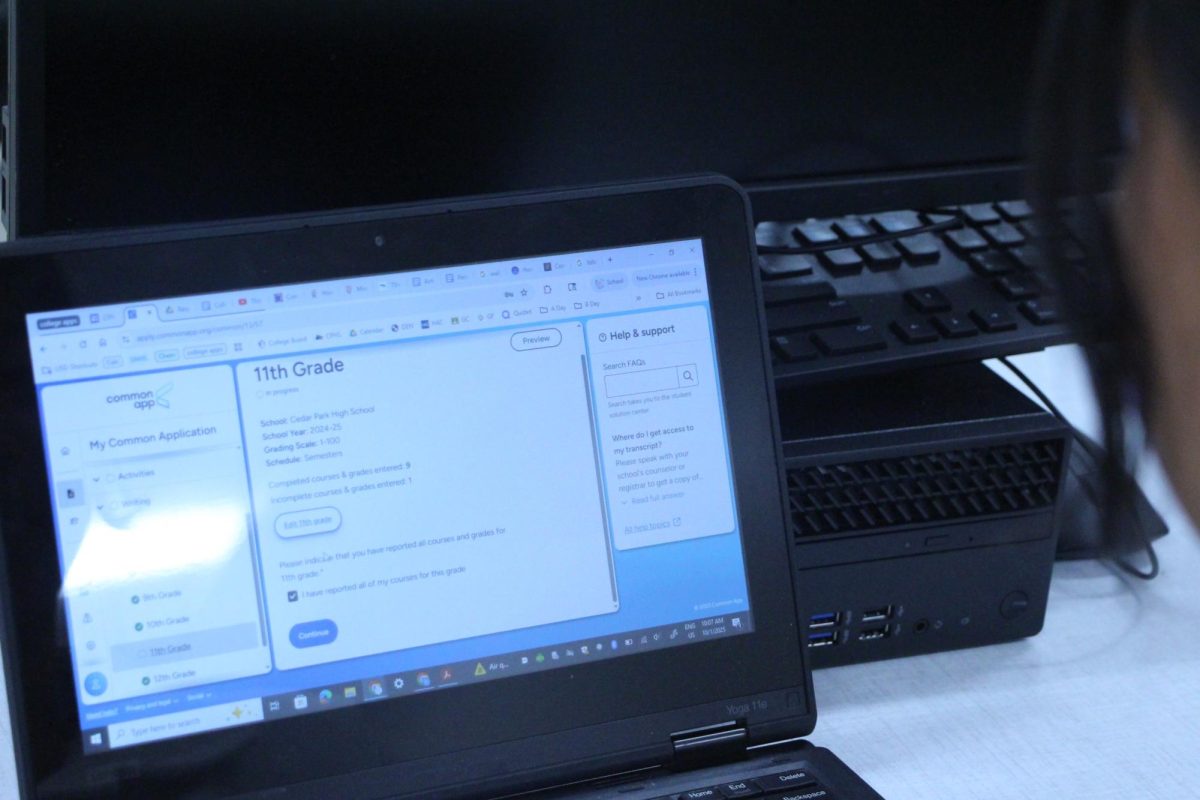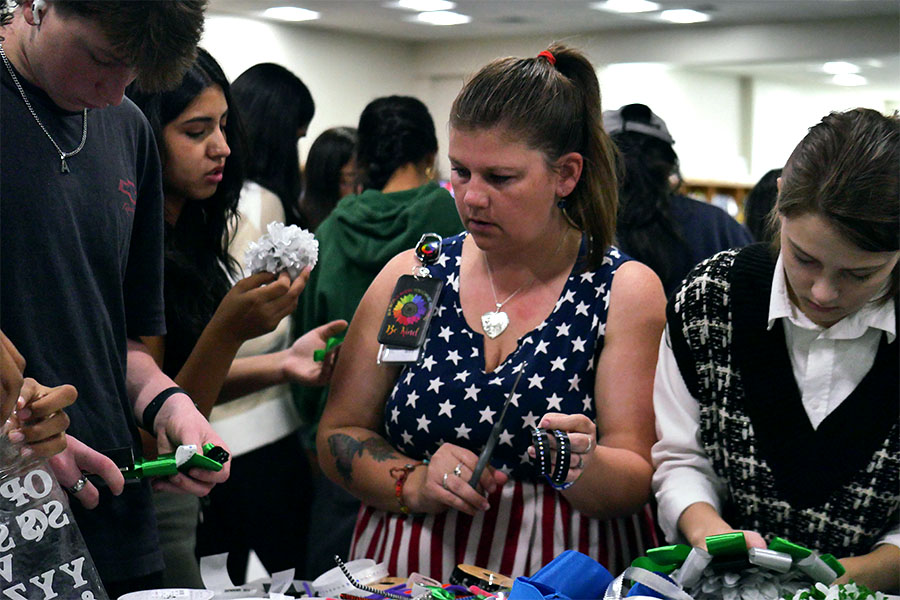Students in room 5001 have their notebooks out. Some are scribbling notes in their notebooks, some have given the teacher their full attention, some of them are half asleep, while others are fooling around. But Lauren Buntin is determined to teach these students some chemistry, and will not let them fail.
Buntin has been teaching chemistry for four years, and said she really enjoys her experience and her job.
“I love it,” Buntin said. “And actually in my first year, I was teaching biology and chemistry and I did not expect to be teaching chemistry. I thought it was just biology, but I liked chemistry better and now I don’t even teach biology.”
A typical day for Buntin consists of preparing the lecture for her students, whether that be on slideshows or anything digital.
“After school a lot of times I have students in tutorials,” Buntin said. “But if nobody stays after school for tutorials, then I’ll work on whatever I’m going to do the next day, whether that’s like the calendar and thinking about how many days to spend on each topic and what to cover on each day.”
According to Buntin, the part of her job she looks forward to the most is teaching her students.
“I think for me the best part of teaching is the students and building relationships,” Buntin said. “You know, you guys are so funny, you guys teach me things all the time and you make me laugh.”
Buntin said she believes it’s very important to her that her students are learning the material and becoming better than they were before.
“One of the most rewarding things is at the end of the year when the school year is coming to a close to just be able to look at you guys and see how far you’ve come since the first day of school,” Buntin said. “I didn’t even know your names, and everybody was nervous and quiet and shy, but by the end of the year everyone’s so happy and everyone knows each other.”
For Buntin, the most important part of her job she says, is the growth that her students are experiencing, whether it be outside or inside of her class.
“You grow up so much from the beginning of your sophomore year to the end,” Buntin said. “You’re getting your driver’s license and you’re gaining all this independence.”
In her career of teaching, Buntin has experienced ups and downs in her job and not every year has been perfect.
“My first year I had a really, really hard class that was just the worst and it was really bad,” Buntin said. “A lot of behavior issues popped up throughout the year, and it was frustrating because it made me feel like there was something more I should be doing or could be doing, but I think sometimes it’s just the way that it goes.”
However, Buntin has not let these challenges ruin her experience and said she does not give up on her students.
“Sometimes you feel like they are only in it because you’ve convinced them to be and it makes it feel like what I did mattered more,” Buntin said. “Even sometimes the hardest classes end up being your favorite or your most meaningful because you made a big difference.”
Buntin often has a lot of papers to grade, and according to her, she tries her best to get everything done in time.
“My mentality is that I assigned it and I made you guys do it, so I don’t get to complain about it,” Buntin said. “You guys worked hard and you turned it in so I owe it to you guys to go through it and to look through it.”
With being a teacher also comes students who are academically dishonest and cheat on their work. Luckily, Buntin has a strategy in place so justice can be served.
“In every test there’s at least two, three or four versions and they each have different answers on it,” Buntin said. “An obvious way to know somebody cheated is if they have the other version’s answers, like how did you get the other test’s answers on your test because those numbers aren’t even there?”
Even though it is an academic dishonesty to cheat, Buntin offers cheaters an opportunity to make up their test.
“I usually just let them redo it for a 70,” Buntin said. “Sometimes they don’t even come ask because they know, they know they got a zero because they cheated and then they don’t want to talk about it and so they don’t ask.”
According to Buntin, she loves working with kids and feels like her job is very different compared to jobs that her friends from college might have.
“You know, maybe they have less stress in the evenings and less things to do outside of work hours and they get paid more,” Buntin said. “But there’s no way that what they’re doing is more fun or more fulfilling, so I don’t think I ever wish that I was doing something different.”
Buntin has been told and knows her class can be challenging for students, but she has advice for those who are currently taking an advanced or AP class.
“Stay on top of your work,” Buntin said. “Don’t let it pile up because if you have a pile of homework then you’re more likely to not do it, or find an easier way out of it, time management skills and staying up to date on assignments is my best advice.”








![As her hair blows in the wind, senior Brianna Grandow runs the varsity girls 5K at the cross country district meet last Thursday. Grandow finished fourth in the event and led the varsity girls to regionals with a third place placement as a team. “I’m very excited [to go to regionals],” Grandow said. “I’m excited to race in Corpus Christi, and we get to go to the beach, so that’s really awesome.” Photo by Addison Bruce](https://cphswolfpack.com/wp-content/uploads/2025/10/brianna.jpg)


![Broadcast, yearbook and newspaper combined for 66 Interscholastic League Press Conference awards this year. Yearbook won 43, newspaper won 14 and broadcast took home nine. “I think [the ILPC awards] are a great way to give the kids some acknowledgement for all of their hard work,” newspaper and yearbook adviser Paige Hert said. “They typically spend the year covering everyone else’s big moments, so it’s really cool for them to be celebrated so many times and in so many different ways.”](https://cphswolfpack.com/wp-content/uploads/2025/05/edited-ILPC.jpg)





![Sitting with her friend senior Sohpia Struve at last year’s Austin City Limits Festival, senior Ava Zuniga poses for a picture under a pavilion. They are frequent attendees at ACL, an annual music festival at Zilker Park. “I would recommend seeing a bunch of people,” Zuniga said. “This past year, we camped out for Chappell [Roan] for a really long time. I think the whole point of ACL, [which] is a lot of fun, is that you can go see so many different people, even if you don’t know them. So by camping by one person, it really limits yourself from being able to go see a bunch of people.” Photo courtesy of Ava Zuniga](https://cphswolfpack.com/wp-content/uploads/2025/10/EE9E9484-FE6F-4AA0-B5F5-0C177AB32841-1200x857.jpeg)
![Looking down at his racket, junior Hasun Nguyen hits the green tennis ball. Hasun has played tennis since he was 9 years old, and he is on the varsity team. "I feel like it’s not really appreciated in America as much, but [tennis] is a really competitive and mentally challenging sport,” Nguyen said. “I’m really level-headed and can keep my cool during a match, and that helps me play a bit better under pressure.” Photo by Kyra Cox](https://cphswolfpack.com/wp-content/uploads/2025/09/hasun.jpg)

![Bringing her arm over her head and taking a quick breath, junior Lauren Lucas swims the final laps of the 500 freestyle at the regionals swimming competition on date. Lucas broke the school’s 18-year-old record for the 500 freestyle at regionals and again at state with a time of 4:58.63. “I’d had my eye on that 500 record since my freshman year, so I was really excited to see if I could get it at regionals or districts,” Lucas said. “ State is always a really fun experience and medaling for the first time was really great. It was a very very tight race, [so] I was a bit surprised [that I medaled]. [There were] a lot of fast girls at the meet in general, [and] it was like a dogfight back and forth, back and forth.” Photo by Kaydence Wilkinson](https://cphswolfpack.com/wp-content/uploads/2025/03/Kaydence-2.7-23-edit-2.jpg)
![As the support team sits and poses for a photo in the cafeteria with the counseling team they eagerly wait to start their day. "We [all] seem to be a team, I get up every day and there's days where I don't want to go to work today, but I'm thankful that I have a job and I'm blessed to have what I have," Christopherson said. Photo Courtesy of Julie Weltens.](https://cphswolfpack.com/wp-content/uploads/2025/01/AF9E8470-10D7-4C91-BF28-EC8F86BAB66C-1200x852.jpeg)
![Jumping off the ground, senior linebacker Bennett Patton snatches the ball out of the air for an interception at Thursday’s game against Chaparral. Patton had two interceptions in the 56-14 victory, tying the school record for interceptions in a game. “I was just playing the game,” Patton said. “[I’m] going to go into next week, forget about it and stay humble.” Photo by Harper Chapman](https://cphswolfpack.com/wp-content/uploads/2025/09/bennett-interception.jpg)












